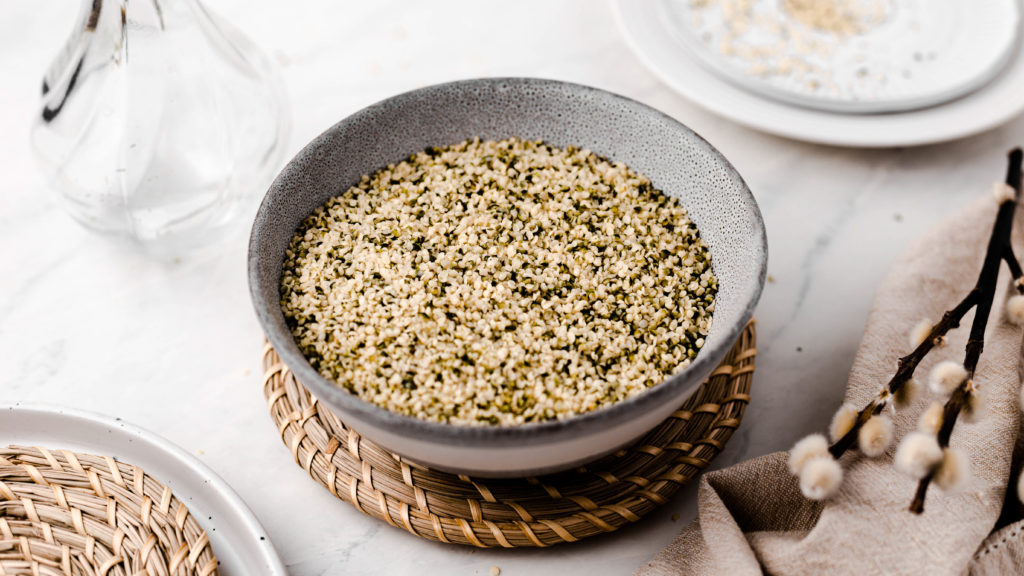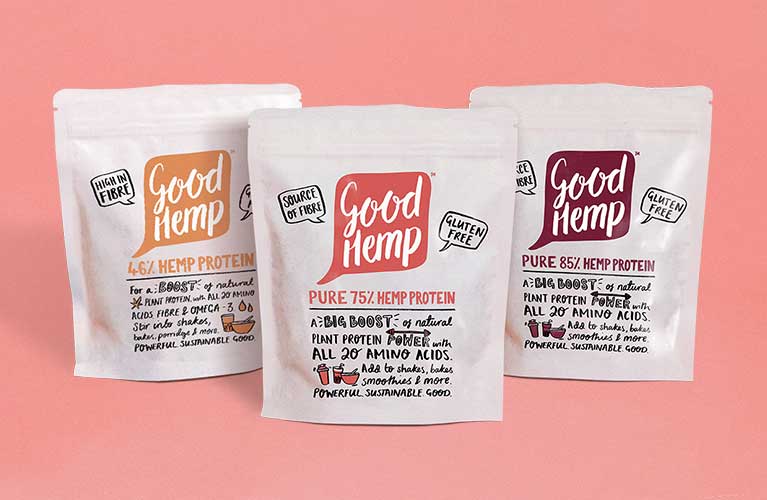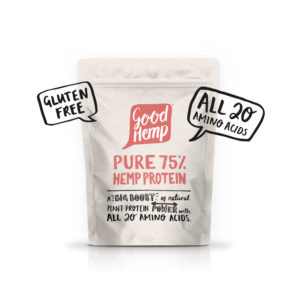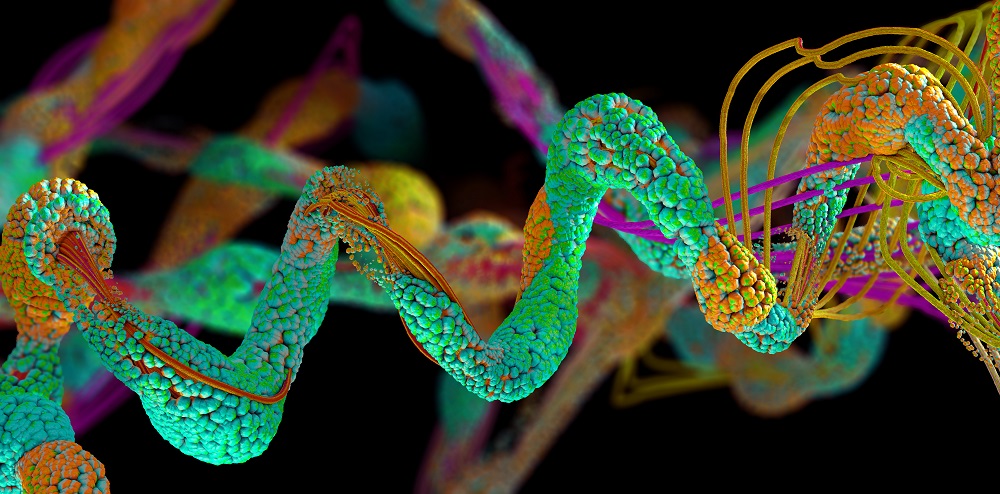A Brief Introduction To The Essential Amino Acids
If you’re serious about fitness, you should be serious about your protein intake.
Protein is a macronutrient that’s essential to building muscle mass and it’s made up of organic compounds called amino acids – these little guys are the molecular building blocks (and stimulators of protein synthesis) that allow us to develop, grow and function properly as humans – so, they’re a pretty big deal!
But that doesn’t mean you have to chow down on a bowl of chickpeas every 5 minutes to meet your daily protein intake, unless you want to of course. At Good Hemp we’ve got your daily dose of the good stuff covered, since all of our protein products are vegan, gluten free, and bursting with amino acids to give you that extra protein boost…
Amino Acids: The Stuff Proteins Are Made Of
The human body needs 20 different types of amino acids to maintain good health, 9 of which are classed as essential (meaning the body can’t produce them) and must be obtained through quality food. When hundreds or thousands of amino acids attach to each other in long chains, they form protein, a macronutrient which helps to build and repair muscles (ideal after a tough workout), maintain bone strength, regulate hormones and repair body tissue.
Good protein sources are commonly found in animal products such as meat, eggs and poultry, but even better for your health and the environment is to get your protein from plant-based products such as hemp, tofu and quinoa. Plant-based proteins tend to be lower in calories and fat than animal proteins, but higher in fibre and essential nutrients such as vitamins and minerals. What’s more, by choosing plant-based proteins over animal proteins you’re doing your share to save the environment: according to researchers at the University of Oxford, you can reduce your carbon footprint by 73% by avoiding meat and dairy products.
Complete Proteins Vs Incomplete Proteins
There are two types of proteins, complete proteins and incomplete proteins. Complete proteins include all of the essential amino acids that our body needs to function. Quinoa, Quorn, soybeans and hemp seeds are examples of complete plant-based proteins – take notes, as these are the foods you’ll want to get more of.

You’ve probably guessed it; incomplete proteins – which includes most grains, legumes, spinach, broccoli and nuts – don’t include all of the essential amino acids, but perhaps a few of each. But all is not lost, as these can often be paired together to make one complete protein. For example: separately, rice and beans are two incomplete proteins, but mixed together in a yummy Caribbean dish they’re transformed into both a whole protein and a wholesome dinner. Problem solved!
However, if you want to skip the research on what pairings you need to make, we have a delicious range of vegan hemp protein powders that contain all 20 amino acids, so you can feel as smug as can be while sipping on that post-workout protein shake.
Essential Vs. Non-Essential Amino Acids
If you’re into health and wellness, you will know that low levels of protein and essential amino acids will directly affect muscle strength and exercise performance, making them a crucial component for increased muscle mass, bone strength, tissue repair, injury recovery and more.
We’ve listed all 20 amino acids below:
| Essential Amino Acids | Nonessential Amino Acids |
| Lysine | Alanine |
| Histidine | Arginine |
| Threonine | Asparagine |
| Methionine | Aspartic Acid |
| Valine | Acid Cysteine |
| Isoleucine | Glutamic Acid |
| Leucine | Glutamine |
| Phenylalanine | Glycine |
| Tryptophan | Proline |
| Serine | |
| Tyrosine |
Introducing The 9 Essential Amino Acids
By now we know that each of the 9 essential amino acids plays a vital role in helping the body maintain optimal health, but how?
Let’s familiarise ourselves with what each of them do:
1. Lysine
If you consider yourself a gym-bunny, Lysine is the amino acid for you, since it focuses on building muscle, maintaining bone strength, regulating hormones and aiding recovery from injuries. It’s an important one to pop post-workout!
2. Histidine
Aesthetics aside, Histidine pays attention to your internal health by enabling the creation of blood cells, maintaining the protective layer over nerve cells and focusing on tissue repair. This amino acid also plays a role in the body’s reproductive health and digestion system – ensuring everything is ticking along just nicely.
3. Phenylalanine
The predecessor for neurotransmitters including tyrosine and dopamine (necessary for brain function and the nervous system), Phenylalanine plays a crucial role in ensuring other amino acids are doing their bit. You’ll find this in the artificial sweetener called aspartame, which is used to make diet drinks – so too much of it will have you bouncing off the walls!
4. Tryptophan
Tryptophan is a predecessor of the neurotransmitter serotonin, which regulates appetite, sleep and mood. Be aware, this amino acid can also be associated with causing drowsiness.
5. Leucine
Similar to Lysine, this amino acid is wound healing, making it really important for protein synthesis and repairing the body’s muscles and bones. Leucine also produces growth hormones.
6. Valine
If you like to meditate, Valine is a three branched-chain amino acid that focuses on your mental focus, energy and emotional calm. It also stimulates muscle growth and regeneration.
7. Threonine
Necessary for healthy glowing skin and teeth, Threonine is a component of the structural proteins collagen and elastin. In addition, it also aids the body’s fat metabolism and protein balance.
8. Methionine
Tag-teaming with the nonessential amino acid Cysteine, Methionine plays a vital role in the health of your skin, hair and nails as well as the absorption of selenium and zinc – antioxidants that fight stress, disease and illness.
9. Isoleucine
Another three branched-chain amino acid, Isoleucine works its magic with a variety of the body’s functions, including muscle metabolism, blood sugar regulation, hormone production, and immune function – another important wound healing number.
How To Get Plant-Based Sources Of Protein
Whether poultry is your top pick or not, there’s a whole host of ways you can get your daily dose of the good stuff through plant-based products alone – and you won’t have to graze on grains all day long.

It’s easy: at Good Hemp we’ve got a whole bunch of healthy hemp protein powders and recipes sure to satisfy your taste buds and boost your protein count. There’s something for everyone to indulge in when you browse our list of yummy recipes, whether you like to sink your protein in a shake, stir it into porridge, give your pancakes an extra punch or get that healthy boost by baking our mouth-watering hemp brownies. Oh, and did we mention our vegan protein powders are a complete source of protein? Yep, that’s all 20 amino acids covered in a few tasty bites!
If you prefer wholefood forms of protein, that’s cool too – we’ve got the lowdown on the top vegan protein sources you can add to your next shopping list, whether you want to whip up toasted nuts and seeds or fry some tasty tofu and tempeh.
At Good Hemp, our mission is to encourage a sustainable way of living that doesn’t sacrifice key nutrients or tasty meals – that’s why all of our products are zero-waste, planet-friendly and packed with proteins, vitamins and minerals. Plus, now you’re clued up on all of the essential amino acids, it’s time to experiment in the kitchen – grab your apron!


